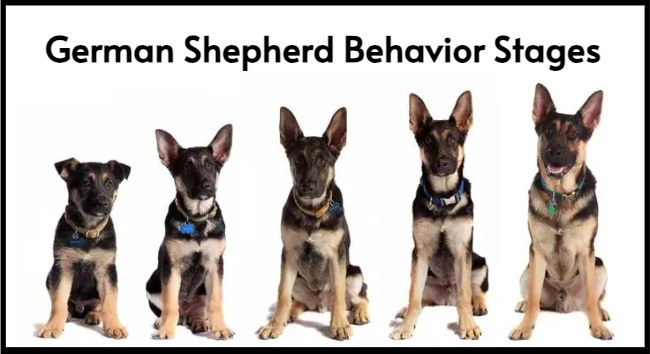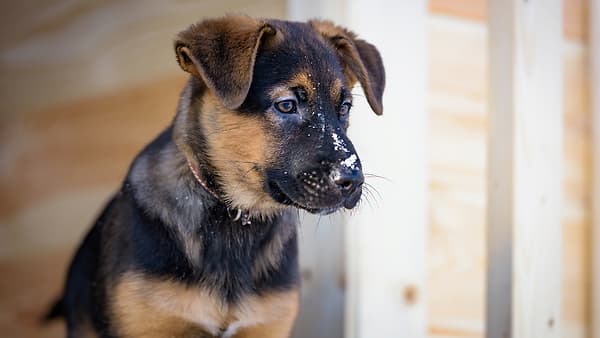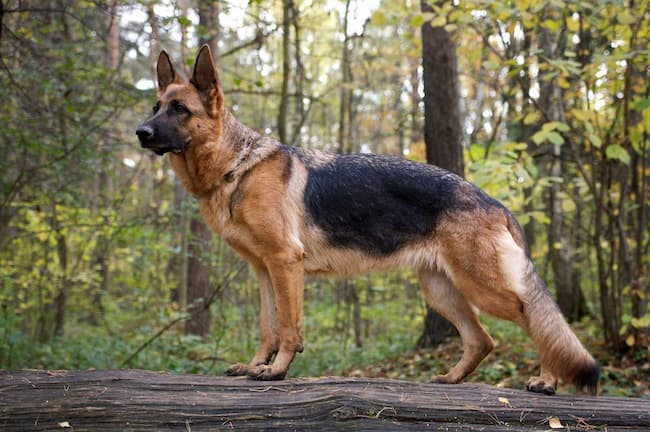German Shepherds are one of the most popular dog breeds, not just because of their striking appearance but because of their exceptional behavior and temperament. However, like all other dogs, they go through different German Shepherd behavior stages throughout their life, from puppyhood to maturity.

Understanding these stages and the changes that come with these German Shepherd behavior stages can help dog owners provide appropriate training and care for their furry friends. In this blog post, we will discuss the different German Shepherd behavior stages and the characteristics of each stage. If you are a German Shepherd owner or planning to get one, continue reading to learn how to navigate the different behavior stages.
German Shepherd Behavior Stages
German Shepherds, from their birth to their full maturity, go through several behavior stages. Each stage has its own set of characteristics that owners need to be aware of. Here is a brief overview of the different German Shepherd behavior stages:
Puppyhood Stage
The German Shepherd puppy behavior stages are from birth until 1 year. The puppyhood stage starts from birth to around 16 weeks old. During this stage, puppies are curious, energetic, and playful. They are also learning socialization skills and exploring the world around them.
As an owner, you should provide lots of socialization opportunities for your puppy, and expose them to new environments, people, and animals. This will help them develop essential skills and become more confident and resilient in the future.

At this stage, German Shepherds also require proper training to learn basic commands, such as “sit,” “stay,” “come,” and “heel.” Positive reinforcement training methods work best for puppies as they respond well to treats, praise, and rewards.
Adolescence Stage
The adolescence stage starts at around 4 to 7 months old and up to 2 years of age. During this stage, German Shepherds can become more challenging to handle as they undergo hormonal changes. They may become more independent and stubborn, and their behavior can be unpredictable.
Owners should continue training their German Shepherds at this stage and provide them with plenty of mental and physical stimulation. They may also need more exercise to burn off their excess energy and reduce their destructive behavior.

Their teenage years may take up to 1 to 2 years and during this period, it is important to provide consistent commands and training to help them transition into the adult stage.
Adulthood Stage
The adulthood stage starts from 2 to 5 years of age. At this stage, German Shepherds are more settled and have established their routines and behaviors. They are more responsible and predictable, and their protective and guarding instincts become more pronounced.
As an owner, you should continue providing regular exercise, training, and socialization activities. You should also ensure that your dog is well-fed, has plenty of fresh water, and receives proper healthcare.

Also, adult German Shepherds may still be treated like puppies, but with more consistency and firmness. It is important to set boundaries and rules and stick to them while providing rewards for good behavior.
Senior Stage
The senior stage starts from 5 to 10 years of age, depending on the dog’s size and breed. German Shepherds at this stage may experience physical and cognitive changes and may require special attention and care. They may also become less energetic and more relaxed.
Senior German Shepherds need extra care and attention, including regular veterinary check-ups. They may also need dietary modifications and more frequent exercise to remain in good health.

At the senior stage, the German Shepherds may start behaving more like puppies and may need extra reassurance and affection from their owners. Owners should focus on providing them with a safe environment, ensuring regular veterinary care, and most importantly, giving them plenty of love and companionship.
More Similar Articles To See
- 2 month old german shepherd
- German shepherd australian shepherd mix
- how to draw a german shepherd
- colors german shepherd
Conclusion
In summary, understanding the different German Shepherd behavior stages can help you provide the best care for your furry friend. From the puppyhood stage to the senior stage, each stage comes with unique characteristics and challenges. However, with proper training, socialization, and care, you can help your pup go through these German Shepherd behavior stages. Visit our German Shepherdss site if you need any help. We will be happy to help.

